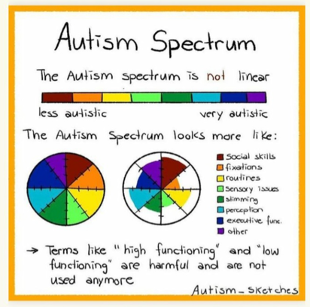Nerea Arranz is a psychologist focused on children and young people, with extensive experience in neurodiversity, especially autism and its comorbidities. Her aim is to understand holistically what families are experiencing and work with parents and education to promote their role as agents of change. Her approach to implement interventions is evidence-based, therefore she adapts the intervention to the individual needs and strengths of each person.
Most people say that being a parent does not come with an instruction manual, this becomes even truer when one or more of your children live in a world that has not been designed for them, this is the case for autism. This blog aims to introduce and name a number of challenges that may arise when autism is part of your family. It is not intended to be an elaborate and complete list where we all have to fulfil criteria; these are challenges that might be experienced or not by parents. If you are a parent of an autistic child and have not related with what is raised in this blog or feel that other challenges have not been mentioned along the way, we would be delighted to hear from you, because every comment, opinion and shared story opens up new queries and helps us to understand more about the diversity that exists in autism.
What do we mean by autism?
Autism is a condition with its strengths and needs that affects the way the brain processes information from the environment, and therefore, how autistic people relate to it. Autism is considered a disability and is listed in the DSM-5 diagnostic and statistical manual as a neurodevelopmental disorder. There are many myths about autism, but a key one is to understand that autism is not linear. You don’t have more or less autism, you are either autistic or you are not.
This image proposed by @autism_sketches aims to help us understand in a visual way how to recognize this condition that implies a challenge to live with, but also inspires, awakens curiosity, compassion and opens our minds to understand different ways of communicating and experiencing the world around us:

Autism in itself is a challenge and when it is the first time it happens in a family, it is accompanied by intense and deep feelings, to the point that it could be described as overwhelming. It is likely to generate doubts and big questions that will accompany you throughout the development of your son or daughter.
We are all different. There is no such thing as the «right» way of thinking, being, learning or behaving. Autism falls within the concept of Neurodiversity, which describes differences in neurodevelopment, alongside strengths and challenges. Neurodiversity is also a social movement that seeks to reduce the stigma around conditions such as autism. Autistic people like to use terms such as neurodivergent or neurodiverse to refer to this differentiation in brain development. A development that changes and affects different areas of a person, and that will vary over time.
So, what are the challenges that parents may face? Here are a series of questions that you may have asked yourselves or, if you are beginning to notice differences in the development of your children, you may be asking right now:
1. Why is this happening to me?
The first and one of the biggest challenges is to understand what autism means for your child and to accept that it is happening. A common saying is that sometimes we cannot see things we do not understand and, therefore, recognizing that your child is showing signs of a developmental differentiation is in itself a challenge. Especially because of the uncertainty it creates. But also because it is very likely that you have already imagined a life with your child that you are now being told you will not be able to live. This is often experienced as grief. In this process of acceptance, there are some bumps in the road, one of them is that the cause of autism is unknown. Not being able to understand the origin of things, generates lack of control, and this lack of control can end up freezing our ability to face what comes after, how we live the present and therefore how we behave with our children who we did not know were going to be as they are.
What could I do?
- Hearing from those with neurodiversity, they know first hand what autism can mean. Autism is a lifelong condition, this means that there are not only children with autism, there are adults with autism. Among these adults, we find a number of people whose aim is to raise awareness of neurodiversity and therefore we have at our fingertips first-hand information of how it could be to live with this condition. Here you have some resources: 45 Autism Youtube Channels For Autistics And Autism Parents, A list of autistic bloggers and YouTubers, A Story Of Undiagnosed Autism and different Stories from the Spectrum.
- Meeting other parents who are also going through a similar moment or who have already gone through it. In other words, participating in a community where you will find understanding and knowledge. One way to find these families, is to connect with specific autism spectrum associations where you live. If you are not yet at that point where you are able to talk about the reality in which you live, you can always start by reading or watching how other people describe the experience of being a parent of a child with special needs. This video is about a story and here you have a playlist with plenty of videos of the autism spectrum.
2. This is called the autistic spectrum, so what now?
While trying to process this grief there is at the same time a clear demand, the need to seek support and services that are going to help your child. The idea of being able to make a decision about what is best for your child, without yet understanding what is happening to them, is challenging in itself.
Therefore, seeking services and support can be a complicated and daunting process, as there are many options and it is not always easy to know which option is best for your family. Among those paths in which a parent finds himself/herself, there is the path of trying to make your child look like the others, which is the aim of certain type of therapies, those that understood autism as something to be corrected. But there is also the way to accept that one can be different and work from those strengths. To teach him/her skills that are going to help him/her to live in the society we live in, but without changing fundamental aspects of his/her being. In order to be able to distinguish what the different treatments offer, and what can be better for your child, it is necessary to understand more about autism and what it means to your family.
In addition, to help autistic people, parents must be involved actively and directly in using strategies in every aspect of the routine, sometimes almost every minute of the day. This is very difficult to juggle with other demands of adult life. Many of the services and possible treatments are also not available for free, so cost and availability will also play a role in the level of help each child can receive.
That is why the phrase «less is more» is important. Start small with what you can get involved with (routine and stability, play, communication, sensory, etc.) and take some time to get to know and trust those people who want to guide you in how to support your child. Consistency will be key, but if you do not trust what they recommend, it will be hard to find the strength to keep trying strategies that will never work right away. It takes time and perseverance to start seeing results, so it is best to take it one step at a time, because there will be many aspects to cover.
For exploring different number of treatments or where to start:
3. How far will it change the life I imagined?
On the journey that starts after recognizing that there is a difference and after hearing the word autism, we find another challenge. How to balance family life and the life of the autistic child: Autism is often accompanied by inflexibility, it is in fact one of the diagnostic criteria. This inflexibility, especially during childhood, will lead parents to have to tolerate or introduce changes in their daily life that they did not expect. In addition, it often falls on brothers or sisters who are more tolerant or have a greater capacity for waiting and understanding.
The difficulty of achieving this balance can generate feelings of helplessness, pain and anger. As well as an opportunity for parents to develop unimaginable skills to meet the needs of different family members. The change in the way parents face day-to-day life will help to find that balance, to be able to observe and differentiate how to promote the autonomy of the child and to identify what things need to be done for him/her instead of to him/her, will bring us closer to that balance.
All this entails a cognitive burden for adults, which may be accompanied by a feeling of exhaustion, which generates rejection or the need to move away from the family nucleus to seek respite or perhaps, on the contrary, an activation and reactivity where others are not allowed to take care of your children. Many professionals place great emphasis on self-care, but the reality is that in the beginning it is very difficult to find that space to take care of yourself and to accept that you will have to sacrifice hopes and wishes in order to ensure that your child achieves his or her full potential, while making sure that no one else in the rest of the family goes unnoticed, including yourself.
It is important to consider the idea that giving your best will be enough to build a world you did not expect, step by step.

4. Why don't others understand me?
Among all these feelings, there is a major challenge and that is the emotion of loneliness. Autism is becoming a more common condition as its incidence is increasing, but that does not mean that your family and friends know or understand what you are going through.
The unpredictable behaviours that often occur when an autistic child has to face a new place are like a constant reminder that your family is different. Therefore, activities such as going to the park, dining out or visiting a museum, places where there are other children with apparently expected development, will remind you of what you are not experiencing.
The neurodiverse community has a long way to go in terms of advocacy and sharing the existance of more than one way of experiencing the world. Therefore, those behaviours that are atypical for us are also valid. In this website you can check more information on neurodiversity.
Everyone, maybe including you, will have experienced rejecting the unknown at some point. This means that on many occasions, as a parent of a child on the spectrum, you will experience rejection and discrimination first hand. You will have to try to be able to separate that those feelings that others share with you, those looks or comments have more to do with how they are feeling and not so much with you. Being able to separate what might be arising from ignorance or fear will help you to cultivate courage on your journey.
Being brave enough to speak up in a society that is not designed or familiar with neurodiversity is not easy, and may take years. Remember that, although you could raise awareness about autism, it is a responsibility that you do not have to impose on yourself. There are always different ways that may work best for you, although they often include seeking help from others, whether professional or informal support, which might change that feeling of discomfort, which many refer to as loneliness.

5. But what is considered atypical behaviour?
Neurodiversity entails behaving in a way that is not usually accepted or expected in the social and cultural context in which the child finds him/herself. It is common, in the course of their development, for autistic children to exhibit what is known as challenging behaviour. The first thing to understand is that this word does not refer to the child as being defiant, but to the fact that his or her behaviour is a challenge to the adult. The responsibility for managing these behaviours lies with the adult and therefore the challenge lies in being able to understand and manage these behaviours. The emotions they generate in adults and how to respond to them is one of the greatest challenges of neurodiversity.
As you become more familiar with what autism will mean for your family, I would like to propose a series of questions you can ask yourself when these behaviours occur. When you do not understand something, your child has done, you can ask yourself:
- Is this autism?
- What is happening in the environment? is it predictable enough for him/her? Could this be related his/her sensory experience?
- How many demands has my child perceived today?
- What happens when he/she acts like this? Does this behaviour help him/her to get something out of it or does it help him/her to avoid something?
- What is my role in mantaining this behaviour?
- What skill could my child learn to reach the same outcome, but in a way that is less challenging for me?
- What can I do next time to prevent it?
To conclude, I would like to name what Dr. Stephen Shore, autistic American professor and advocate for autism once said:
If you know one autistic person, you only know one autistic person.
Just as autism is experienced so differently from person to person, this is also reflected in the challenges that each parent will face. It is important to remember that this is not something you have to do alone, that you could seek support to explore those questions that autism raises for you as a parent, and to look for practical ways to implement on a daily basis that will enhance you family quality of life.
Sinews MTI
Psychology, Psychiatry and Speech Therapy

